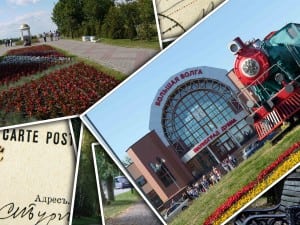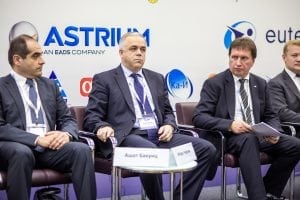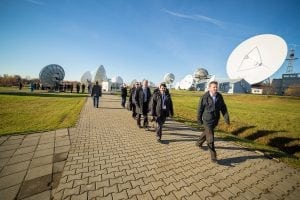Latest News

SatComRus 2013 was held in the historic town of Dubna, around three hours north of Moscow. At this conference, Russia’s top satellite executives get together to discuss the industry in one of the world’s major markets for satellite communications.
I arrive in Moscow late evening. Going through passport control is a breeze and we head towards Dubna. The highlight of the journey is being stuck 45 minutes at a railway crossing as it seems every train in Moscow needs to pass this particular part of track. I swear at this point I will never complain about the railway system in the United Kingdom ever again – although I am unlikely to keep this promise. We eventually get past and arrive in Dubna at around midnight; the next day I have to present my thoughts on the global satellite market at SatComRus, as well hear speakers mainly from Russia talk about the industry in their country.
The next morning we head to the conference facility in Dubna, which is about a 10-minute drive from my hotel. My contact at RSCC points out a nuclear missile research facility and I catch a glance as we speed toward the conference. There are new and old parts of Dubna; it is an interesting town to visit, as there is a sense of history, but also modernization. It seems a vibrant place where a lot of gifted scientists and engineers live. With a population of around 70,000 people, it is a town on the banks of the famous Volga river, one of Russia’s crucial and most famous waterways.

The opening panel at SatComRus provided many talking points about satellite’s role in Russia. Photo: SatComRus
The opening panel at SatComRus reads like a who’s who in the Russian satellite industry as key industry figures debate the future of the trade in this country. Even though I am listening to the audio translation, there is a sense of optimism about satellite’s role. Igor Chursin, deputy head, Federal Communications Agency (Rossvyaz), gives a ringing endorsement of satellite saying “satellite communications is one of the few elements of the economy that counter-acts the crisis in the world.”
“We want to give further impetus for the development of satellite communications in Russia. I would like to add the following: The development of satellite communications and broadband access are programs we are running together. There is a certain forward movement. I think it is high time the need to put in a broadly based national program. The proposals are being finalized by the Ministry. We will prepare a package of documents soon for these plans,” he says.
Chursin admits that RSCC, the Russian satellite operator, will play a vital role in reducing the “digital inequality” in the country. “Given the territory and size of Russia, and large number of distant populated areas, the role of RSCC is very important,” he says. “We have 2.5 million of our population in the Artic region. For this region, we are working on several projects involving satellites. One of the top priorities of the Federal Communications Agency and the RSCC is the modernization of the Russian constellation.”
Mikhail Kaygorodov, deputy director, infrastructure project department, Ministry of Communications, addresses the audience saying that “a lot of the economy depends on satellite communications” and this is not likely to go away. “There are hard climatic conditions in the Siberia and Far East. There are remote areas with poor telecoms services. About 26 million households do not have access to broadband. In order for satellite communications to become part of the program, we have to resolve many tasks. We need to increase the capacity, as well as the efficiency of use for satellites,” he ads.
Yuri Prokhorov, RSCC’s director general is one of the main speakers on the panel, and outlines the operator’s plans to become the fifth ranked FSS operator in terms of revenues by 2020. The company also announced plans to launch a further three satellites alongside a number of other launches slated over the next 18 months. Prokhorov speaks of Russia boasting nine time zones and five broadcasting zones: when it is midnight in Petropavlovsk-Kamchatsky, the local time in Moscow is 3:00 p.m., and in Kaliningrad 2:00 p.m. Prokhorov says that, in purely geographic terms, Russia today cannot organize its communications and TV/radio services without satellites. He says RSCC will support the delivery of free federal TV/radio packages to the five zones, i.e. across the entire RF territory, while in the future, communications channels will be set up to deliver federal TV multiplexes.
Prokhorov also points to DTH being a success story in Russia on many levels. “Over the past six years, the national DTH system has been breaking all records,” he says. “In the first six months of 2013, the customer base of Tricolor TV, the largest Russian DTH platform, posted a 9 percent growth. As of August 2013, as many as 13 million households were Tricolor TV users, i.e. almost 40 million persons, or every fourth Russian citizen.”
A major theme of SatComRus 2013 is the potential for satellite broadband, especially given that there are millions of households in Russia that cannot get access to terrestrial broadband services. In August last year, RSCC launched its broadband Internet project in Ka-band, based on Eutelsat’s Ka-Sat beams that reach Russia.
“In just one year the service attracted about 4000 private individuals as users. The customer base would have grown even faster but for the limitations of the Ka-Sat satellite whose coverage extends only to the Moscow region, Kaliningrad, and Leningrad region with the city of Saint-Petersburg therein. In 2014, using the Ka-band capacity of the Russian Express-series satellites, we intend to build our own Satellite Broadband High-Bitrate Access System (SBYBAS). According to preliminary estimates, up to 400,000 users may join the system already at an early phase,” Prokhorov says. “Regarding Russia’s northern territories that can hardly be served from GEO orbits, we are currently exploring opportunities to build a satellite constellation on the high-elliptic orbit. Four Express-RV satellites to cover Eastern Siberia and the Arctic region may well be orbited by 2020.”
Prokhorov is optimistic that by SatComRus 2014, things will have moved on even further both for RSCC, as well as the satellite industry in Russia. “The Russian Telecommunications Commiussion is preparing new legislation, and the space industry will remain topical,” he says. “The Russian Government has a program to provide broadband up until 2020. That will involve RosTelecom. This is a socially significant program. They are subsidized by national budget. There is a 122 billion rubles [$384.1 million] Digital TV program. Russia is the last of the developed countries where analog TV is still here for quite a while.”
Vladimir Terekhov, head of EADS Astrium in the RF, general director, JV Energia SAT, perhaps makes the most colorful analogy of the morning session saying the Russian satellite industry “looks like an old pond, but yet it is still beautiful. The question is whether it will get rejuvenated.”
TV in Russia
DTH is proving a lucrative market for TV services in Russia with the likes of NTV+ and Tricolor TV. The latter hopes to bring its services to the Far East region of Russia next year, once there is new capacity in the market. “At 140 degrees east longitude, the new satellite is planned to be launched, we have leased its transponder capacities in July. We have already performed all the necessary ‘land’ work, prepared distribution channels, studied the whole marketing component; therefore, when the satellite will be launched, citizens of Vladivostok or Nakhodka will have the possibility to come to our dealer and to say, ‘Please connect me to Tricolor TV,’ and they will be connected – like in any other region of Russia,” Sergey Stavropoltsev, commercial director of Tricolor TV, told Via Satellite in an interview before SatComRus. “Moreover, the new satellite at 56 degrees east will be used for needs of our Siberian project. Siberia will get the same scope of digital television as the European part of Russia.”
The future of TV is also keenly debated at SatComRus, with the need for satellite capacity a leading theme in the morning panels. “We are near to catastrophic position in the East of Russia due to a lack of capacity,” Konstantin Saltykov, technical director, Orion Express, says to the attendees. “We can’t offer anything to subscribers regarding HD. We have started to analyze what we can do.”
Viktor Pinchuk, deputy director general, Russian TV and Radio Networks (RTRN), says they are implementing a major infrastructure project to bring digital TV to people across Russia with three multiplexes built by 2015. “There will be 30 different channels available across all of Russia, using regional modifications, etc. Despite our predictions that linear TV will die in Russia, they were wrong. In 2015, analog will decrease to 60 percent of the population. [The 30 channels] are a social guarantee. We are ready to switch to HD. In the last meeting of the working group, they took a position to create five test zones (for HD). The first channel will we be trying the technical solution in HD quality,” he says.
Venture Capital in Russia
One of the changing dynamics of the Russian market is the different sources of investing in space based projects. While the Russian government will continue to play a major role in developing satellite capacity and services, particularly in the Far East of the country, venture capital companies are also willing to fund projects. Igor Agamirzian, general director, RVC (State Fund of Funds and a Development Institute of the Russian Federation) remembered how a few years ago venture markets did not exist in Russia at all. “Over the last five years, there has been explosive growth,” he says. “Russia is estimated by international agencies [to be] in first place for the growth rates for venture capital; it is fourth overall in Europe. In absolute figures, our presence is growing. Private investment has grown; they go to low risk parts of the economy, they go to IT, telecommunications investments, etc.”
Afternoon Session
The morning session is a “tour de force” of the Russian satellite market with speakers from the likes of the Communications Ministry, RSCC, ISS Reshetnev and many others. However, SatComRus is changing with times. The first afternoon session is all about the international opportunities for Russian satellite companies. I give the first presentation in English and talk about trends in the global satellite market. Others talk more specifically about Asia and Africa. It is a fascinating panel. My only regret is I can’t take notes, as I am one of the presenters. But, the panel is an important one for the event as it brings an array of diverse perspectives on the global satellite market. This is not an insular event which only concentrates on Russia. This in itself is illuminating.
RSCC Teleport
The second day many of us get a tour of RSCC’s teleport facility in Dubna. It is impressive, and even though it is not my first tour of a teleport (and unlikely to be my last), it is still eye opening. I have my first and only vodka during a lunch where many toasts are made in Russian. I raise my glass to them, not knowing of course what I am raising my glass too. It is my first vodka in years – It tastes good, I have to say.
We then get driven back to Moscow to catch a flight back to London, with my two-day trip to Dubna at an end. We get stuck at the same railway crossing again. I can’t help but laugh, as it adds an amusing anecdote to my trip – I have enjoyed my visit to Russia.
What is exciting about the Russian satellite industry is that there is huge scope for broadband and TV services in the country. The market is opening up, and Russia is much more a part of the global satellite eco-system than it has ever been. One of my key takeaways from this event is that there is a real sense of community within our industry and whether you are born in Vladivostock or Virginia, the advancement of society through satellite and space technology is something that drives us all in this business, and I will definitely raise a vodka to that.
Get the latest Via Satellite news!
Subscribe Now